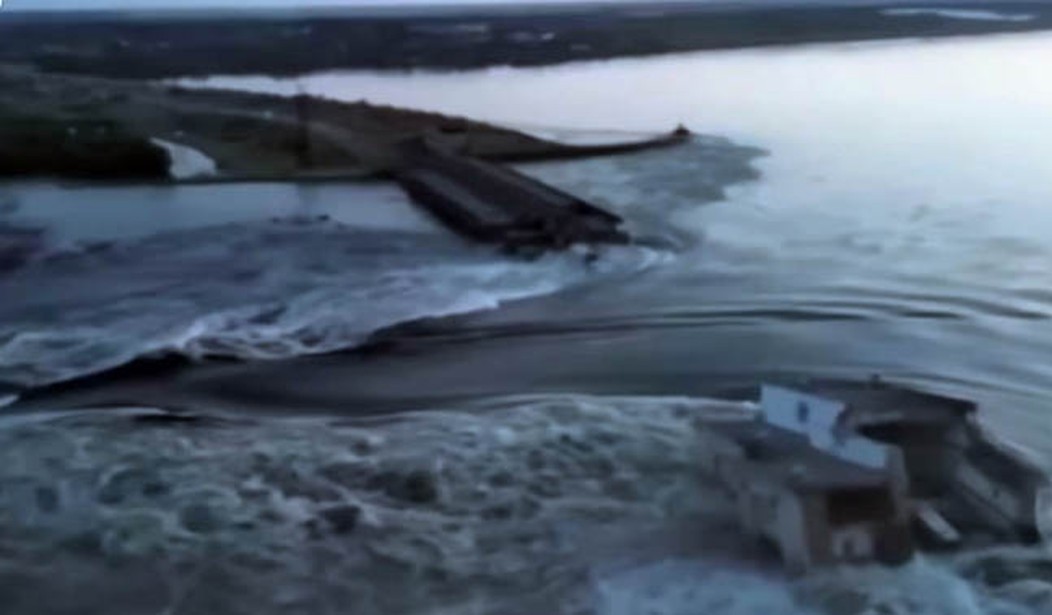It was pretty clear to everyone that the destruction of the Kakhovka dam was not an accident. Today the NY Times has a follow-up story saying there’s some pretty good evidence proving that’s the case.
A senior Biden administration official says that U.S. spy satellites detected an explosion at the Kakhovka dam just before it collapsed, but American analysts still do not know who caused the dam’s destruction or how exactly it happened.
The official said that satellites equipped with infrared sensors detected a heat signature consistent with a major explosion just before the dam collapsed, unleashing huge floodwaters downstream…
Seismic data picked up by the NORSAR observatory in Norway also supported the theory there had been large explosion near Kakhovka dam on Tuesday at 2:54 a.m. local time, when the structure collapsed. NORSAR said in a statement that signals captured from a station 385 miles away from the dam show clear indications of an explosion.
So we can rule out an accident. Previous reports suggested that the most likely way to blow this up would be to do so from the inside. This was a massive steel and concrete structure which would have been difficult to blow up from the outside. By placing bombs inside, you contain and channel the full force of the explosion into destruction. According to munitions experts the Times spoke with, we’re not talking about a few light-weight backpacks. Bringing down the dam would have required “hundreds of pounds of explosives.”
And that’s one of the factors that has some people leaning toward blaming Russia. The dam isn’t an undersea pipeline like the Nord Stream which is unmanned and unobserved most of the time. This was a major facility including a massive hydro-electric plant which had workers on site. Russia has been in control of the facility for more than a year. So if it wasn’t them, then whoever did it somehow had to bring in hundreds of pounds of explosives without the Russians noticing.
Earlier today Ukraine’s security service (SBU) released what they say is a Russian call intercept in which a soldier says the destruction wasn’t done by Ukraine but by their own sabotage group.
Russian sabotage group blew up Kakhovka dam; it didn’t go as planned, SBU intercept alleges
Two Russian militarymen are heard discussing the explosion, which is said to be an operation to “scare” that went wrong. https://t.co/VXSCUbWpab pic.twitter.com/cyUMAVrTbI
— Euromaidan Press (@EuromaidanPress) June 9, 2023
The Times reported on the intercept but also noted the details were vague.
The Ukrainians did not provide basic details that would allow independent verification of the tape, including who the participants were, why the speaker might have known what happened and why anyone might have been listening to this particular call.
Artem Dekhtyarenko, press secretary for the SBU, said in a written message that the call happened on Thursday, but that other details, such as the speakers’ locations and identities, were being withheld because “this record is an element of criminal proceedings.”
It’s still possible this was pulled off somehow, under Russia’s nose, by the Ukrainians. It certainly seems to have scrambled Russia’s defenses though it may also have made it impossible for Ukraine to move armor though the south for weeks or months to come just as their counter-offensive was gearing up. That’s what a NATO official told CNN today.
A NATO military official told CNN that, while it will take some time before they know for certain who was responsible for the destruction of the Nova Kakhovka dam in Ukraine, they believe Russia was likely behind it. The official added that Russia stood the most to gain by the move, which could potentially slow down an anticipated Ukrainian counteroffensive, if it were to take place in that part of the country.
It’s not clear what exactly that NATO official’s assessment is based on, but Newsweek has a story up pointing to Russia’s shifting statements in the hours after the dam blew up.
In December 2022, a video was published on YouTube in which a member of the Russian military said that the Kakhovka dam had been mined, and would be blown up with the aim of impeding the advance of Ukrainian forces.
The dam appeared to burst at around 2:50 a.m. local time, according to Russian Telegram channels, but Kremlin-installed officials denied for hours that anything had happened until the ramifications of the disaster became clear.
At 4 a.m. local time, the Russian-installed mayor of Kakhovka, Vladimir Leontiev told reporters that claims about the dam’s destruction are “nonsense,” adding that all was quiet and peaceful in the town.
But hours later Leontiev backtracked, saying that there were several strikes on the dam at about 2 a.m. local time.
Meanwhile, pro-Russian milbloggers and state media reporters simultaneously pushed the line that the dam was “worn out,” and collapsed on its own, saying that there were no strikes on the power station overnight.
It sounds like they don’t have their story straight in those early hours. But there’s one more clue which may be the most interesting of all. One week before the dam blew up, on May 30, Russia passed a new law:
The legislation states that until January 1, 2028, investigations into accidents at hydro-technical structures that occurred as a result of military operations, sabotage and terrorist activities are prohibited. The decree was signed by Russian Prime Minister Mikhail Mishustin and came into effect on the day it was published.
That’s a pretty curious law to have passed a week before the explosion.
Update: A bit more about that curiously timed law.
Keir Giles, senior consulting fellow at the Chatham House think tank’s Russia and Eurasia program, said the May 30 legislation follows the Kremlin’s playbook, which seeks “to pretend that it operates according to some semblance of legality.”
“Russia has a perverse fascination with performative legalization of its most horrific crimes…it repeatedly puts in place in advance laws that give preemptive excuses for its actions,” Giles told Newsweek…
“So in the case of the destruction of the Kakhovka dam, the passing a week beforehand of this bizarrely specific law covering precisely those circumstances is indeed a clear indication of Russian intent,” Giles added.








Join the conversation as a VIP Member